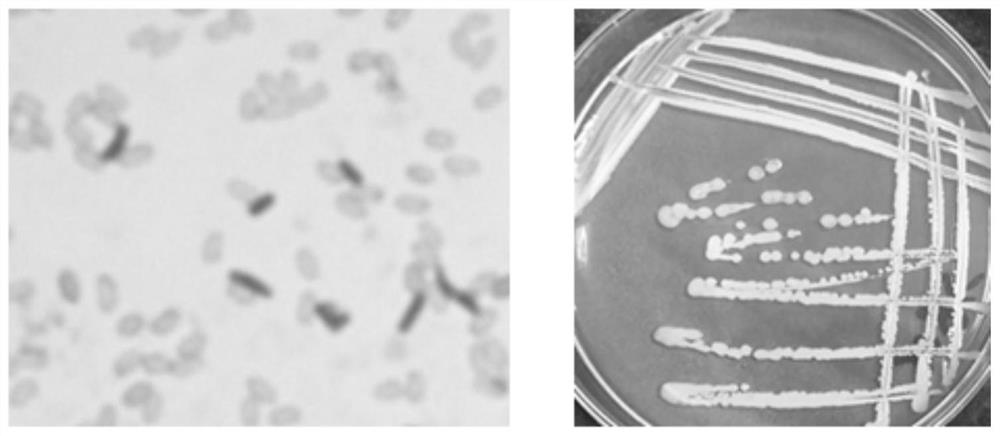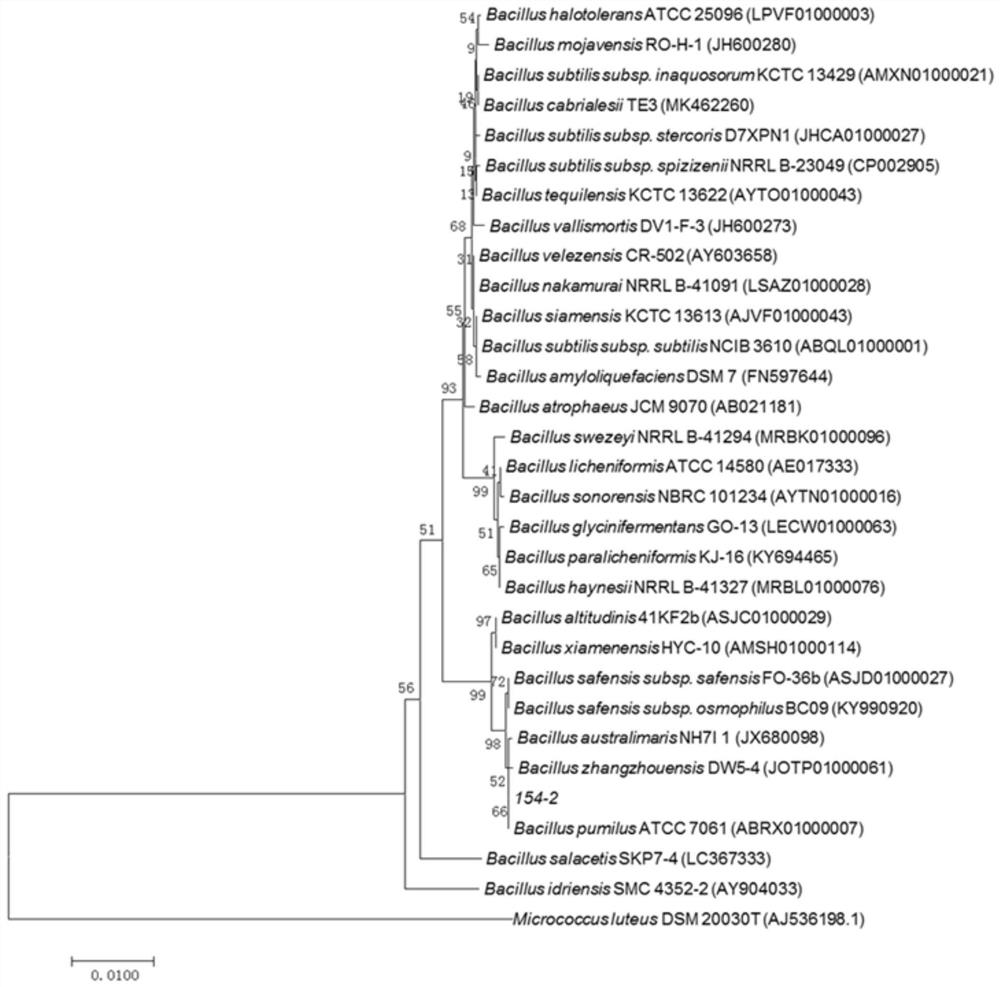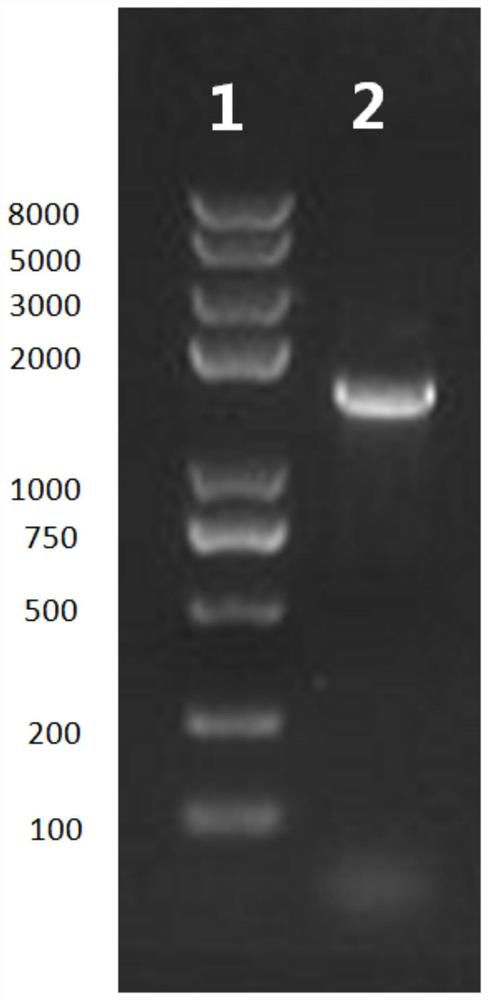Bacillus pumilus and application thereof
A kind of Bacillus pumilus, germ technology, applied in the field of microbial technology application
- Summary
- Abstract
- Description
- Claims
- Application Information
AI Technical Summary
Problems solved by technology
Method used
Image
Examples
Embodiment 1
[0042] Embodiment 1, the acquisition of Bacillus pumilus 154-2
[0043] 1. Soil source
[0044] Soil of East Wheat Field in Wanglaoba Village, Yuanzhou District, Guyuan City, Ningxia
[0045] 2. Screening of bacterial strains
[0046] (1) Soil sample collection
[0047] Zig-shaped 5-point sampling method for soil sample collection: collect 200g soil sample at each point, mix the soil sample evenly, take 200g by quartering method and put it into a sterilization bag as a soil sample. Three soil samples were collected from each plot as replicates. Record the time, place and type of sampling. The collected soil samples were stored in a refrigerator at 4°C for use in bacterial isolation.
[0048] (2) Isolation of bacteria
[0049] Plate dilution method: Weigh 10g of soil sample into a Erlenmeyer flask, add 90mL of sterile water, then shake at 200rpm, 28°C shaker, take it out after 20min and let it stand at room temperature for 10min to make the stock solution of soil bacteria...
Embodiment 2
[0058] The 16S rRNA gene identification of embodiment 2 bacillus pumilus 154-2
[0059] Genomic DNA of strain 154-2 was extracted,
[0060] Using primers: 27F 5'-AGAGTTTGATCCTGGCTCAG-3' and 1492R5'-TACGGCTACCTTGTTACGACTT-3', the extracted DNA was used as a template for PCR amplification to obtain the target fragment. The PCR reaction system is:
[0061] Table 1 Taq polymerase chain reaction system
[0062]
[0063]
[0064] The basic conditions of the PCR reaction were: pre-denaturation at 94°C for 3 min, denaturation at 94°C for 30 s, annealing at 56°C for 30 s, extension at 72°C for 90 s (1 kb / min), pre-extension at 72°C for 8 min, and storage at 4°C for a total of 30 cycles. After the reaction, the PCR products were checked by 1% agarose gel electrophoresis, and the gel imager was used to detect and record the results. The gel electrophoresis results of 16S rRNA gene were as follows: image 3 as shown, image 3 Among them, 1 represents Marker; 2 represents the produ...
Embodiment 3
[0067] Physiological and biochemical identification of embodiment 3 Bacillus pumilus 154-2
[0068] The physiological and biochemical characteristics of Bacillus pumilus 154-2 of the present invention are: able to secrete β-galactosidase, 3-hydroxybutanone to produce acetylmethylmethanol and gelatinase; unable to hydrolyze arginine, lysine, ornithine acid, sodium citrate and sodium thiosulfate, etc.; cannot oxidize glucose, mannitol, rhamnose, and sucrose; can utilize 20 carbon sources such as L-arabinose, ribose, D-xylose, fructose, and mannose Acid production, see Table 2 and Table 3.
[0069] Table 2 Physiological and biochemical characteristics of strain 154-2 - enzyme activity, carbon source oxidation
[0070]
[0071]
[0072] +: Positive reaction; -: Negative reaction;
[0073] Table 3 Physiological and biochemical characteristics of strain 154-2 – acid production using carbon source
[0074]
[0075]
[0076] +: Positive reaction; -: Negative reaction; W...
PUM
 Login to View More
Login to View More Abstract
Description
Claims
Application Information
 Login to View More
Login to View More - R&D
- Intellectual Property
- Life Sciences
- Materials
- Tech Scout
- Unparalleled Data Quality
- Higher Quality Content
- 60% Fewer Hallucinations
Browse by: Latest US Patents, China's latest patents, Technical Efficacy Thesaurus, Application Domain, Technology Topic, Popular Technical Reports.
© 2025 PatSnap. All rights reserved.Legal|Privacy policy|Modern Slavery Act Transparency Statement|Sitemap|About US| Contact US: help@patsnap.com



